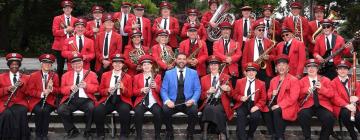For the retro-noir movie The Paw, McBane deployed prepared piano, trumpet, and string orchestra. He has also composed for choreographers and founded the Carlsbad Music Festival in San Diego County, devoted to what’s called “alternative classical music.” Within his Brooklyn-based band Build, which he's bringing to the Cafe du Nord and Northern California for the very first time, McBane plays violin. Perhaps the most acoustic and least electronically dependent of the triple-bill groups, Build has been located by the New York Times as "a stone's throw from chamber music," with the stone coming somewhere between rock and Reich. Some of Build’s haunting, artfully layered shorter pieces have been employed as interstitial music by NPR.
San Francisco-based George Hurd has created what might be termed Smooth New Music for dramatic and documentary film, as well as for local theatrical productions. He further explores these shimmery acoustics with his George Hurd Ensemble, bonding string instruments with piano and electronics. He grew up in Chicago playing drums and viola, before extending his interest to drum machines and other synthesizing devices.
The films for which Jack Curtis Dubowsky has created scores have showcased homosexual themes from dramatic and comic perspectives. The music of his Ensemble features a strong foundation of drum (Fred Morgan) and bass (Dubowsky), under imaginative synthesizer patterns (also worked by Dubowsky), with expressive and sometimes rib-tickling input from trombone and a vocal effects processor (Hall Goff). The bicoastal composer studied composition at the San Francisco Conservatory and writes and teaches about both music and film at New York University.
